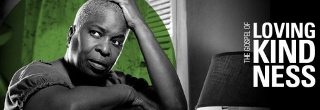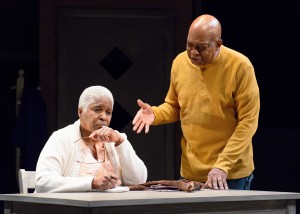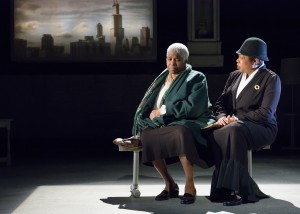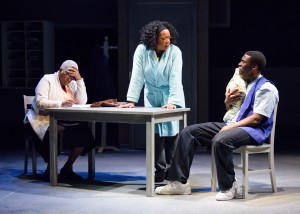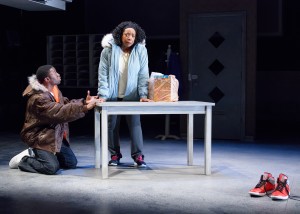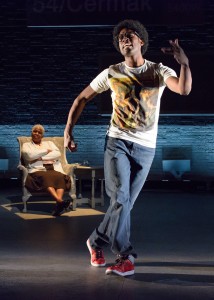THE FORCE OF FORGIVENESS
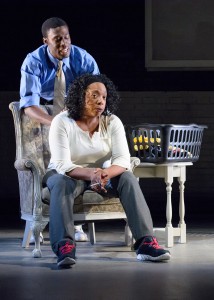 What’s too ugly or scary to process, let alone to confront, in real life is grist for the mill of theater, such as how a gun appears and death comes out of nowhere. In the optimistically titled The Gospel of Lovingkindness, hit-and-run scenes present the prelude to, and aftermath of, a mindless, random South Side killing, one of many to curse Chicago in recent years. Though it’s hard to believe this too-typical killing could become a media sensation, a supposedly seminal murder is explored from the inside out in Victory Gardens Theater’s often compelling world premiere.
What’s too ugly or scary to process, let alone to confront, in real life is grist for the mill of theater, such as how a gun appears and death comes out of nowhere. In the optimistically titled The Gospel of Lovingkindness, hit-and-run scenes present the prelude to, and aftermath of, a mindless, random South Side killing, one of many to curse Chicago in recent years. Though it’s hard to believe this too-typical killing could become a media sensation, a supposedly seminal murder is explored from the inside out in Victory Gardens Theater’s often compelling world premiere.
“Ensemble playwright” Marcus Gardley bases his 90-minute slice-of-death on the true tales of two mothers whose sons lost and destroyed each other’s futures. Artistic director Chay Yew finds four perfect players to give Gardley’s troubled script urgency. But, their ardor aside, this is yet another play whose problem outshadows its solutions: The Gospel of Lovingkindness is stronger for the debates it ignites than any answers it offers.
There’s absolutely nothing here that isn’t toxically familiar to anyone who collects our local headlines about senseless slaughter. Cheryl Lynn Bruce is Mary, the earth-mother survivor whose sweet, unathletic son Manny (Tosin Morohunfola) is killed by Noel (also Morohunfola), a gang-banger wannabe, one more punk from the projects. Noel, sick of making chump change at Wal-Mart, is dared by his drug-dealing uncle (Ernest Perry Jr.) to steal Manny’s newly acquired $260 designer sneakers. Completing the quartet of Windy City wounded is Jacqueline Williams, doggedly depicting Noel’s hapless letter-carrying mother, one more victim caught in the crossfire.
What follows is passionate but utterly predictable, an exposure of the reactions, both considered and kneejerk, to Manny’s murder. His father is perplexed by the mother’s aggressive refusal to mourn: Instead she becomes a crusader (like the great Ida B. Wells who Williams also depicts), going on talk shows to attack prosperous African-American politicians who pretend jail is the only answer to problems they’re unwilling to prevent. She rallies local residents to take back the streets. She refuses to succumb to any anger that would paralyze action. She will not go gentle into the jungle that used to be a neighborhood.
In effect Mary preaches the title testament to the unbitter end, when she obsessively washes invisible blood from the site of Manny’s execution. Accompanying her in this symbolic cleansing is, ironically and implausibly, the mother of her son’s killer. But Mary doesn’t know this since Noel has been able to get away (with murder). Nobody gets closure in this drama.
No question, it’s hard to imagine more solid, grounded, non-negotiable acting, as rooted in the play as it is in Chicago. Also, no question, forgiveness under these circumstances’”when justice has failed to complete the crime’”amounts to a ferocious force of nature. Mary’s powerful peacemaking may not short-circuit the cycle of violence but, as Yeats said, “A terrible beauty is born.” Driven home by Bruce like a message from God, it’s a force to be reckoned with. To that extent, so is this too-recognizable, utterly unfresh new play.
The Gospel of Lovingkindness
Victory Gardens Biograph Theater
2433 N. Lincoln Avenue in Lincoln Park
scheduled to end on March 30, 2014
for tickets, call 773.871.3000
or visit www.VictoryGardens.org
for info on this and other Chicago Theater,
visit http://www.TheatreinChicago.com
